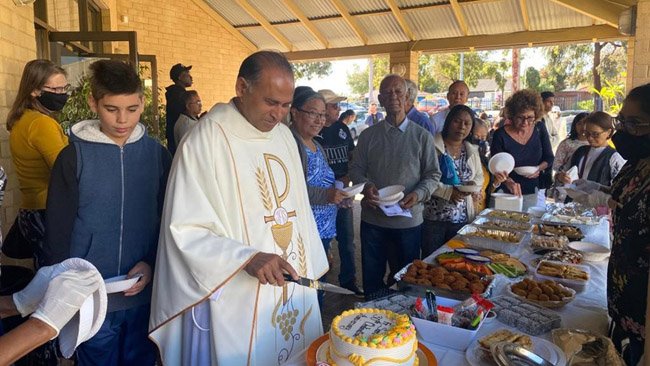When Fr Albert Saminedi SDB paused to reflect on his vocation to the priesthood, he emphatically and without hesitation exclaimed, “I have no regrets being a priest”, and, to others, it is obvious he embraced his calling and ministry wholeheartedly and continues to do so today, reports The eRecord.
Fr Sam celebrated the 30th anniversary of his ordination at his parish, Our Lady of Mercy Church in Girrawheen, Perth, on April 30.
Fr Albert Saminedi SDB cuts his anniversary cake. Mass was celebrated and a morning tea hosted on 30 April to celebrate his 30th anniversary of priestly ordination. Photo: eRecord/Supplied.
His 30 years of priesthood have been colourful and very well spent in the service of others as a missionary in countries many people were too scared to go to but, for Fr Sam, it was his call.
Born in Kilacheri, a small town towards the south of India, Fr Sam was brought up in a wonderful family of five children.
His schooling was at the Don Bosco Institution, and it is this affiliation with the Salesian Order that so clearly intertwines its way through Fr Sam’s vocation and life.
As a university student in India, Archbishop Mario Mugalunde from the Archdiocese of Iringa Tanzania, East Africa, visited and spoke of the need for missionaries in many countries, including Africa, and it was then that Fr Sam saw the call for himself.
He went to Africa to help as a missionary and, by 1980, two years after the Archbishop’s talk, he joined the Salesian Order, the very order which educated him.
Fr Sam was ordained in 1992, having studied in India, Africa and Rome, and Arabic Studies in Egypt. It was during his time in Rome studying theology that volunteers were asked to do missionary work in South Sudan, where it was heard a priest had been kidnapped. Being such a big ask, no one put their hand up except Fr Sam.
His time in South Sudan, Wau specifically, included no running water, no electricity, no telephones and security was required to follow him around. But it was there, struggles aside, that Fr Sam to this day feels his passion for missionary work.
This missionary work was an initiative by Rome to set up ‘Project Africa’. Starting from scratch, it was the first time the Salesian Order had gone to Africa. They built 11 schools and four churches, even with the government always being against them. “They want to keep them [the people] ignorant,” he said, a far cry from his own passion for educating youth.
There were greater difficulties yet though, as the period of missionary work was also during the war in Sudan at the time. In 1999, Wau was heavily bombed. Until that point, there had been three missionaries in the community, with Fr Sam as one of them, but that year saw two expelled, which left Fr Sam carry on the work alone for another three years. At this point, he was principal of John Paul II College and it was left to him to run the entire school in all its facets. Not only that, he also had to divide his time between the college and other schools and churches the Salesians had established.
His passion for helping and teaching reigned over it all though and, in total, Fr Sam spent 20 years working in the missions. Once the community had their own priest and was flourishing, he saw it time to leave. His work has not stopped in Wau though, but continues from afar, with a team of people helping him here in the diocese of Perth with the current project under way of building a 200-bed hospital.
Much of Fr Sam’s family is in Perth and so he came here. His involvement in communities did not stop once leaving Sudan though. Speaking six languages, including Hindi, Arabic and Swahili, Fr Sam involved himself in migrant communities in Perth. He became involved with the Ethiopian Church, the Lebanese and Syrian communities, and the Arabic Sudanese community in Westminster, to which he still provides an Arabic Mass every Sunday. It is obvious that Fr Sam’s 20 years in Africa and 20 years in Perth have been well spent, and deeply appreciated by many.
This is a slightly abridged form of an article by Grace Feltoe, published in The eRecord, the online publication of the Archdiocese of Perth.

